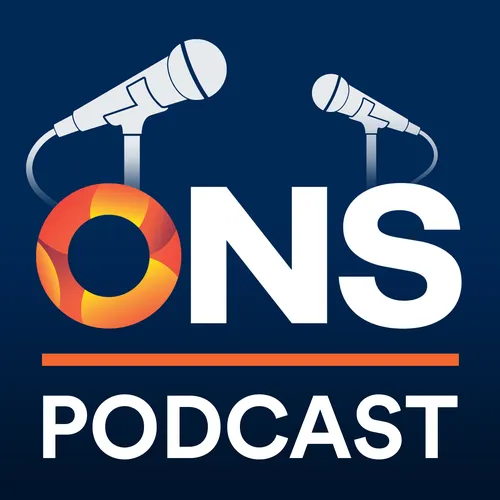
The ONS Podcast
Where ONS Voices Talk Cancer
Join oncology nurses on the Oncology Nursing Society's award-winning podcast as they sit down to discuss the topics important to nursing practice and treating patients with cancer.
ISSN 2998-2308
- Update frequency
- every 7 days
- Average duration
- 34 minutes
- Episodes
- 383
- Years Active
- 2017 - 2025

Episode 280: Create a Culture of Safety: Learning Culture
“As nurses and healthcare providers, we need to be up to date with the most current evidence-based practices. To achieve and maintain this, we must institute a learning culture. It is critical to pr…

Episode 279: Hematopoietic Stem Cell Transplantation for Scleroderma and Other Autoimmune Diseases
“I think the most amazing thing we see is the softening of the skin, which can occur during the first two weeks of the conditioning regimen. The nurses on the floor see it, and I think it’s just a tr…

Episode 278: Cancer Symptom Management Basics: Hepatic Complications
“I think that as oncology nurses, we need to keep ourselves really educated and up to date with these new therapies, because I honestly feel like we still haven't really seen the long-term effects of…

Episode 277: Futility in Care: How to Advocate for Your Patients and Prevent Ethical Distress
“One of the things about futility is many people will say, ‘Oh this is futile care,’ when what they really mean is, ‘Who in their right mind would want this?’ or ‘I would never ever want this,’ and t…

Episode 276: Support Young Families During a Parent’s Cancer Journey
“Reassuring doesn’t always mean providing solutions. Sometimes, it’s providing support. There are some key tips that can be helpful for supporting patients when they’re ready, when they’re asking, ‘W…

Episode 275: Bispecific Monoclonal Antibodies in Hematologic Cancers and Solid Tumors
“It’s really important to look at where your target is and what the toxicities are associated with hitting that target. Make sure you include that thinking when you’re talking about bispecifics,” ONS…

Episode 274: Music Therapy for Patients With Cancer
“You don’t have to have any musical background to benefit from musical therapy,” ONS member Susan Yaguda, MSN, RN, manager of integrative oncology and survivorship in the Department of Supportive Onc…

Episode 273: Updates in Chemotherapy and Immunotherapy
“It’s really an exciting time to be in the field of oncology because we can have these specific drugs that target these specific variants rather than, back in the day, when we had to use kind of gene…

Episode 272: Oncologic Emergencies 101: Radiation Therapy for Emergent and Urgent Interventions
“Like all emergencies, they’re unpredictable. I have seen them at the very beginning and sometimes, unfortunately, that can be the patient’s first sign or symptom that they have cancer. It can be som…

Episode 271: Intraventricular and Intrathecal Administration: The Oncology Nurse’s Role
“These patients have very intense regimens of chemotherapy. They’re tired a lot of the time. Between their oral chemotherapy, their IV chemotherapy, their hospitalizations, and then coming in. Everyt…

Episode 270: Meet the ONS Board of Directors: Brown, MacIntyre, and Woods
What is it like to guide a professional association that serves more than 100,000 oncology nurses? ONS Chief Executive Officer Brenda Nevidjon, MSN, RN, FAAN, and 2023–2026 Directors-at-Large Susan B…

Episode 269: Cancer Symptom Management Basics: Gastrointestinal Complications
“Since gastrointestinal complications are so broad, you will see these types of complications in really any oncology setting,” ONS member Kara Freedman, MS, RN, AGCNS-BC, PCCN, OCN®, clinical nurse …

Episode 268: Race in Research: From Subjects to Scientists, ONS Scholar-in-Residence Has a Career Commitment to Racial Equity
“If we’re not driving our own research agenda and we’re not asking the questions we see as important, we are not realizing the full potential of nursing. We know, because we are with patients, what t…

Episode 267: Side-Effect Management for CAR T-Cell Therapy for Hematologic Malignancies
“I think the take-home message here, though, is to have very specific guidelines at your institution to manage both CRS and ICANS. The protocols should be readily available to all practitioners who m…

Episode 266: Create a Culture of Safety: Reporting Culture
“We need to continue to remind everyone that reporting culture improves safety, that events are usually because of a system or process gap, and there is a clear difference between a system gap and ne…

Episode 265: Intravesical Administration: The Oncology Nurse’s Role
“Sometimes you think, ‘Oh, these are just bladder patients; it’s different.’ But it might not be different. They still have a cancer diagnosis; this is still going to be a very fearful and unsettli…

Episode 264: Stop the Stressors and Improve Your Mental Health as a Nurse
“The mental and physical health of the healthcare team, especially the nurses, has to come first because if you are not physically and mentally and spiritually in a good place, you cannot help other …

Episode 263: Oncology Nursing Storytelling: Renewal
An essential act of well-being, the practice of storytelling creates a social connection that fosters a sense of community and mutual support in both the storyteller and listener. During the Second A…

Episode 262: LGBTQ+ Inclusive Nursing Care Begins With Using Supportive Language
“Being an ally means you’re coming from a place where you know what issues are going on, you stay up to date about what’s happening in the world, and just because you don’t identify as part of the LG…

Episode 261: CAR T-Cell Therapy for Hematologic Malignancies Requires Education and Navigation
“Just like with anything we do in oncology, a lot of education is required. Nurses and coordinators are critical to start the education and provide effective resources that are reinforced throughout …